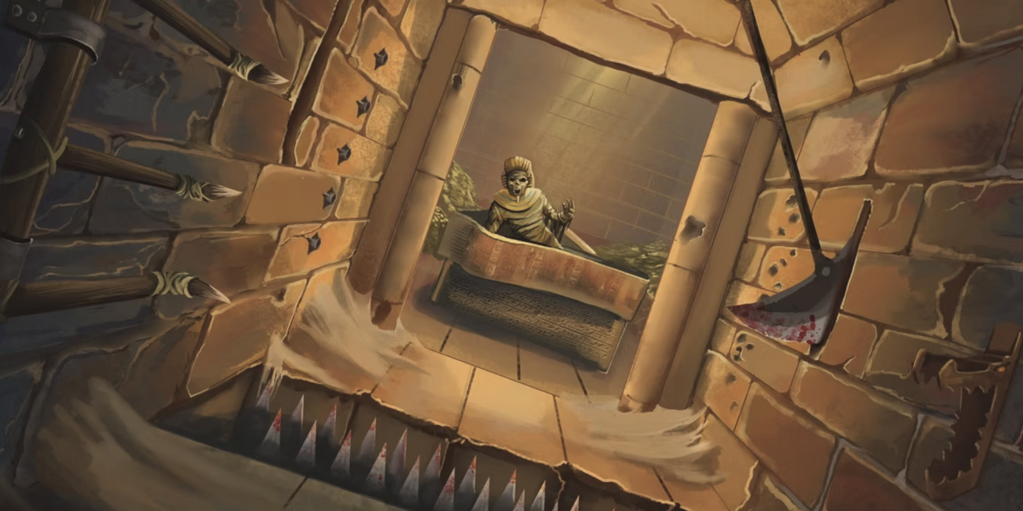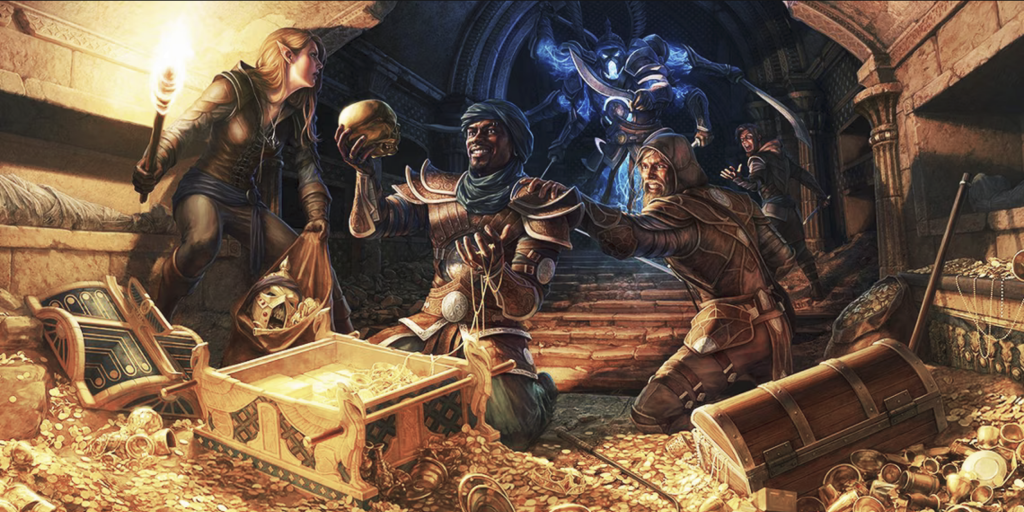I love tricks, traps, and puzzles, but only if they make sense for a given dungeon. Why would the creator of the dungeon create that particular trick, trap, or puzzle? I think there are a few good justifications.
Justifications
Defense
Inhabitants of a dungeon should be able to navigate it with ease. This means tricks and traps that are particularly difficult or dangerous should be in disused rooms and corridors. If the dungeon is not currently inhabited by intelligent creatures, the hazards might be left over from the previous inhabitants, but it’s unlikely they would all work quite right, unless they had some sort of magical custodian.
In an inhabited dungeon, the inhabitants might also arm a deadly trap and/or difficult puzzle as a last-ditch effort to keep the raiders from getting into their treasure vault. If they fight off the heroes, they will disarm the trap or solve the puzzle easily, but if they don’t, the heroes will be left facing the worst peril of the adventure.
If a magical lock has a password, the creator might add a puzzle next to it that, once solved, provides the password or a hint needed to remember it.
Mysticism
Cultists of a given faith might want to confuse their own followers to instill awe in them. These tricks, traps, and puzzles can be in main chambers but should be something the priests or monks can ignore; it’s just “mysticism for the masses”.
They can be illusions, talking statues, floating objects, moving murals, etc. In certain cases–especially for a trickster god[dess]–solving the puzzle can be a revelation ritual showing off the priest’s magical power and secret knowledge. Imagine the faithful arrayed before the altar, and the priest solves the equivalent of a sacred Rubik’s Cube to open a secret door to bring out the golden furnishings for a ceremony.
Cursed Magic
Sometimes, a trick or trap can be a cursed magic item. Such items can result from an accident in the crafting process and might be left as a trap for raiders.
Or it may be–in an evil temple, for example–that the item is magically aware that the adventurers are raiders and not faithful adherents, and it tricks, harms, or curses them as a result. Or the trick or trap can be the result of the heroes simply not knowing how to disarm the object, whereas a priest or other inhabitant would.
Or the enchantment might not even be a curse from the point of view of the original owner. An item that causes the wearer to take on a hideous or demonic countenance when using the item would be a feature, not a bug, for evil priests.
Mad Spellcasters
I like to say that over-using high-level spells will gradually make you very eccentric (1-in-20 chance of losing 1 point of wisdom per casting), which can ultimately result in some kooky magic items or even a whole funhouse dungeon.
Mad wizards and priests shouldn’t be overused, but every adventuring party should have the experience of skulking thru a funhouse dungeon of wacky tricks, traps, and puzzles at least once.
Perhaps the mad wizard decided that anyone who could solve his puzzles and survive his traps deserved his treasures. Or perhaps a mad high priest arrogantly believed that only the faithful could solve his puzzles and survive his traps.
Giving Hints
It’s rare that a GM can play-test tricks, traps, and puzzles before using them in an adventure, so be prepared to give hints. But they don’t have to be free. Mad wizards and high priests in particular (knowing their faithful are forgetful) might include hints–perhaps with a punishment for requiring one.
- You suffer a divine rebuke (comical insult and 1d4 hp electrical or necrotic damage) from the talking idol.
- Each hint from the talking painting causes part of the treasure to be destroyed or teleported elsewhere. The heroes may even be able to see this (in reality or depicted in the painting).
- You must present your backside to a hint-giving donkey statue for a nasty kick (1d4 hp bludgeoning damage). Can you fool it by padding yourself? Or blocking it with a shield? Maybe.
- To get a hint from the mystical voice in the bottomless well, you must chuck a quantity of gold coins into the well. Can you fool it with an illusion, stone, or copper coins? Maybe.






Leave a comment